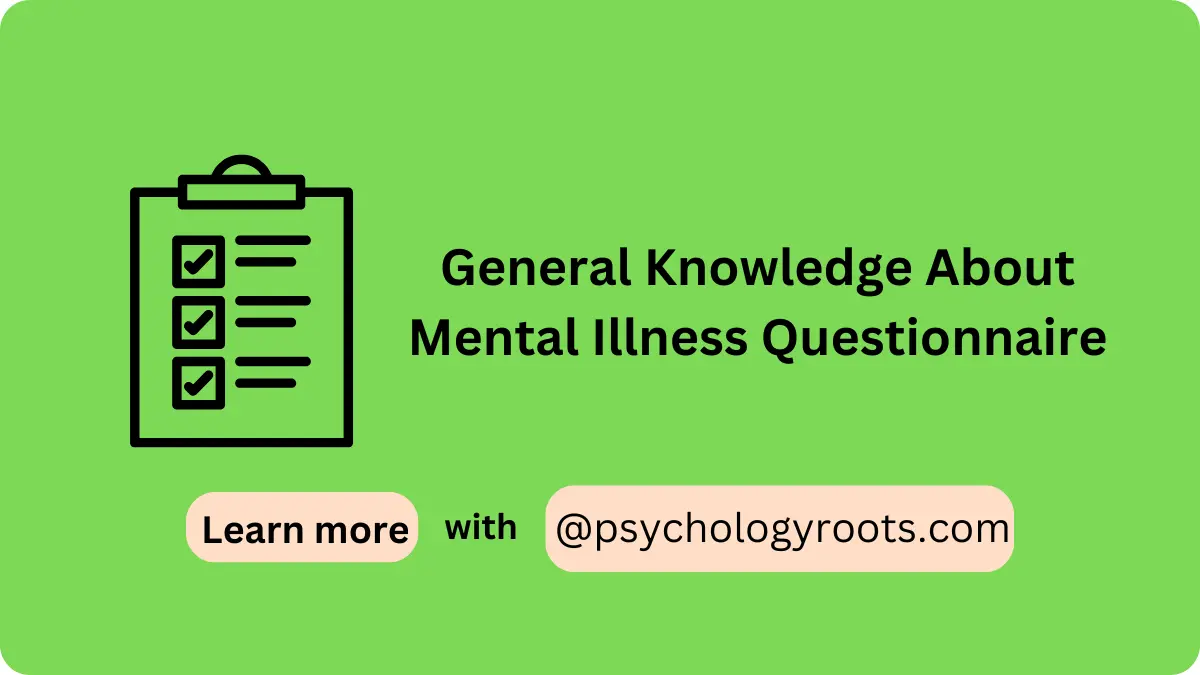Table of Contents
General Knowledge About Mental Illness Questionnaire
Here in this post, we are sharing the “General Knowledge About Mental Illness Questionnaire”. You can read psychometric and Author information. We have thousands of Scales and questionnaires in our collection (See Scales and Questionnaires). You can demand us any scale and questionnaires related to psychology through our community, and we will provide you with a short time. Keep visiting Psychology Roots.
About General Knowledge About Mental Illness Questionnaire
Scale Name
General Knowledge About Mental Illness Questionnaire
Author Details
N/A
Translation Availability
English

Background/Description
The General Knowledge About Mental Illness Questionnaire is a widely used assessment tool designed to measure individuals’ knowledge, perceptions, and awareness of mental health and mental illnesses. Its primary goal is to evaluate the understanding of mental health conditions, their causes, symptoms, treatments, and associated stigma. This tool plays a crucial role in identifying knowledge gaps and misconceptions about mental health, particularly in public awareness campaigns, educational settings, and research studies.
This questionnaire typically covers the following topics:
- Symptoms and signs of mental illnesses.
- Causes and contributing factors, including biological, psychological, and social influences.
- Treatment options such as therapy, medication, and community support.
- Common myths and misconceptions about mental health.
- Stigma and its impact on mental health outcomes.
The data gathered from this tool is invaluable for designing educational programs, debunking myths, and promoting mental health literacy among various audiences.
Administration, Scoring and Interpretation
- Preparation: Determine the target population (e.g., students, healthcare workers, general public) and customize questions to align with their context.
- Distribution: Provide the questionnaire in either paper or digital format. Ensure participants are briefed about the purpose of the assessment.
- Completion: Participants answer multiple-choice or true/false questions about mental health knowledge.
- Analysis: Compile responses to identify patterns in understanding, gaps, and areas requiring intervention.
- Follow-up: Use findings to develop or refine mental health education programs, awareness campaigns, or interventions.
Reliability and Validity
N/A
Available Versions
Multiple-Items
Reference
N/A
Important Link
Scale File:
Frequently Asked Questions
N/A
Disclaimer
Please note that Psychology Roots does not have the right to grant permission for the use of any psychological scales or assessments listed on its website. To use any scale or assessment, you must obtain permission directly from the author or translator of the tool. Psychology Roots provides information about various tools and their administration procedures, but it is your responsibility to obtain proper permissions before using any scale or assessment. If you need further information about an author’s contact details, please submit a query to the Psychology Roots team.
Help Us Improve This Article
Have you discovered an inaccuracy? We put out great effort to give accurate and scientifically trustworthy information to our readers. Please notify us if you discover any typographical or grammatical errors.
Make a comment. We acknowledge and appreciate your efforts.
Share With Us
If you have any scale or any material related to psychology kindly share it with us at psychologyroots@gmail.com. We help others on behalf of you.